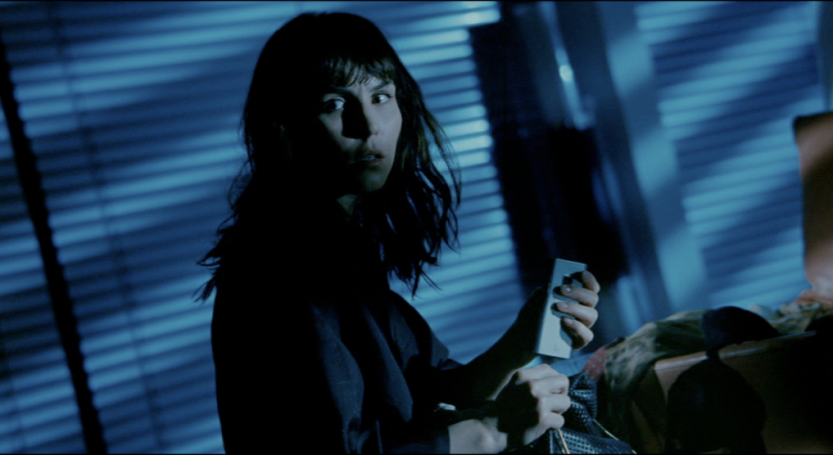 If there’s a more definitive auteurist statement put to film this year than the dazzling split-screen centrepiece of Brian De Palma’s Passion – a close-up on trembling female eyes and puckered lips; a showering blonde; an elegant ballet; black gloves and a giallo mask – I’ve yet to see it, and frankly I don’t want to. A lithe, luscious and serpentine thriller, varnished and executed to perfection, Passion is equivalent to Cocteau’s Orphée (1950), Fellini’s City Of Women (1980) and even Hitchcock’s Vertigo (1958) as a summation, examination and evolution of the aesthetic and thematic motifs of a director’s cinema – it is a rare item of authorial perfection, even if the experience itself is not perfect.
If there’s a more definitive auteurist statement put to film this year than the dazzling split-screen centrepiece of Brian De Palma’s Passion – a close-up on trembling female eyes and puckered lips; a showering blonde; an elegant ballet; black gloves and a giallo mask – I’ve yet to see it, and frankly I don’t want to. A lithe, luscious and serpentine thriller, varnished and executed to perfection, Passion is equivalent to Cocteau’s Orphée (1950), Fellini’s City Of Women (1980) and even Hitchcock’s Vertigo (1958) as a summation, examination and evolution of the aesthetic and thematic motifs of a director’s cinema – it is a rare item of authorial perfection, even if the experience itself is not perfect.
Ostensibly a remake of the 2010 French thriller Love Crime, starring Kristin Scott Thomas and Ludivine Sagnier, Passion tells the story of corporate usurpation-turned-psychosexual obsession between severe (and severely blonde) Christine (Rachel McAdams) and mousey, reticent yet ambitious Isabelle (Noomi Rapace). The tension arises when top-tier Christine takes credit for one of Isabelle’s marketing ideas on a new phone campaign (I’ll just say… Ass-Cam), and when Isabelle sneaks the idea back from under her, boardroom tactics turn to bedroom tactics and become more dangerous and sinisterly sexual as they unfurl.
De Palma’s Ass-Cam may seem like his first attempt in Passion to re-engage the male gaze, that decades-old concept of feminist film theory which has previously flagged the director as misogynist, but in fact it’s the first moment in Passion to engage with its primary and sole gaze: female. The film’s only significant male character is a sniveling suit who tries his hardest to manipulate Christine and Isabelle but is always overpowered by them, especially sexually. When Isabelle discovers a strap-on dildo in Christine’s drawer he bluntly remarks that, in bed, she’ll get “whatever she wants“, suggesting an ultimate form of domination.
A third principal female – Isabelle’s assistant Dani (Karoline Herfurth) – complicates this idea further, as she performs the dual role of receptacle for Isabelle’s emotions and a fly in the narrative ointment, when a wonderfully silly third-act twist reveals her part in the plot. Her early encounters with Isabelle, rather than being simple mouthfuls of exposition, act as character beats foreshadowing her big revelation; surprise, surprise, involving the lusty female-on-female gaze. There are no femme fatales here, or perhaps there are three in perpetual rotation, but this is what marks the film out as singular in De Palma’s oeuvre – the men are pathetic, weaselly, emotionally castrated, capable of fucking but as little more than an empty shell – their gaze would mean nothing. The women here hold the power, and it is their POV through which the director pipes his outlandish vision.
For its first twenty minutes Passion unfurls slowly and cumbersomely, as De Palama (who wrote the screenplay, adapted from Alain Corneau and Natalie Carter’s original) rushes through his setup to get to the juiciest cues – the killings, nightmares and against-the-clock set-pieces. This makes it hard to judge the exact pitch of McAdams’ and Rapace’s performances, which at first appear a little stilted, but given the benefit of the doubt they do eventually come into their own, and just when the film’s straight-to-video tone and aesthetic reveal themselves as intentional, so too does it become a case of laughing with these actresses rather than at them.
It’s at the halfway point, during the aforementioned split-screen centrepiece that Passion reveals its truest, sleaziest colours, and from then on it’s the perfect De Palma showcase, a sumptuous joyride through the director’s most outlandish motifs – the lighting goes into almost expressionistic overdrive, the pacing ramps up to double-speed, and the brilliant and sustained use of subjective camerawork during a prolonged interrogation plugs us back into the De Palma of yore, recalling Sisters (the split-screen here is his best since that 1973 masterpiece, blending two dissociative sequences and challenging our perception of who is narrator and who is voyeur; who is watching and being watched, culminating in an elegant, simultaneous climax of each action) and Dressed To Kill. To say anything of what happens would be an unfortunate spoiler, but the director hasn’t been this assured in a quarter century. After the debacle of 2007’s Redacted, Passion also finds De Palma back shooting on 35mm, and its like watching him coming home.
Elsewhere composer Pino Donaggio whisks together the most provocative cues from his De Palma back-catalogue to craft a creamy, full-bodied suite – it’s an almost peerless piece of pulp orchestration, matched only by the Herrmann-esque strings of Alberto Iglesias’s score for 2012’s The Skin I Live In. The comparison doesn’t end there, as Passion DP José Luis Alcaine is Almodóvar’s regular cinematographer, and defined the cold, muted palette of The Skin I Live In. His work here – sublime as pastiche patchwork – is well studied in the language of noir and 80s/90s erotic thrillers (everything from James Spader/Rob Lowe vehicle Bad Influence to 1996’s devilish Diabolique gets a look-in), with its canted angles, filtered light (turning every office into a potential prison cell) and fluent tracking pitting you into a pre-established, and for genre fans very familiar mood (indeed, like the best of De Palma, Passion evokes such a precise feel through framing, light and editing that you could follow the story just as well with the sound off, and the fever-pitch finale is a wordless, cross-cut masterstroke).
A final note – watch it twice. A first viewing will find you figuring out the tone, nodding toward the references and enjoying the ride as it picks up traction. The second time around those initial twenty minutes sit more comfortably – a whirlwind of office politics, sexual betrayal and callback setups (it threatens us with a doppelgänger motif and then holds it back for the duration), it plays more self-aware in the knowledge of what follows, and you gather that the slightly undisciplined structure is all in service of a greater good – those juicy auteurist cues.
Passion is an extraordinary return to form for De Palma, and its presumed (not to mention expected) awfulness turns out to be gleeful, self-aware genre abandon – this is a mucky, perverse world full of ludicrous twists and turns, flashbacks, lesbian trysts and pill-popping anti-heroes. If you’re not having fun, you’re just not doing it right.
